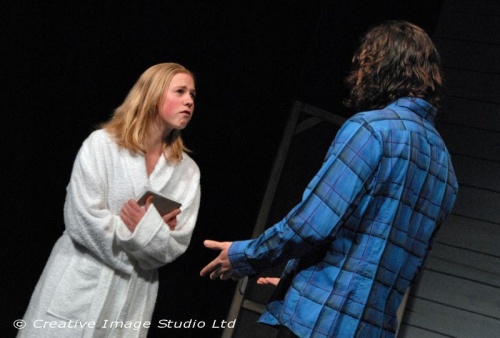Proof
Globe Theatre, 104 London St, Dunedin
29/05/2008 - 07/06/2008
Production Details
Proof is the powerful and compelling story of a young woman haunted by her father’s legacy of genius, and madness. Catherine has spent years caring for her father, a celebrated mathematical genius whose life and career are cut short by mental illness. She struggles with the mathematical talent she has inherited from her father, as well as the possibility that she may be prone to his mental instability.
The multiplicity of Proof is what makes the play so universally appealing. It’s necessarily multi-layered because it deals fundamentally with what we choose to believe about ourselves and others, and what "proof" we have or feel we need in order to do so.
CAST
Catherine: Sarah Paterson
Hal: Chris Hopkins
Robert: Brian Kilkelly
Claire: Angela Thomsen
CREW
Stage Manager: Andrew Cook
Set: Andrew Cook
Lighting Design: Jeffrey Vaughan, Kathy Creswell-Moorcock
Poster: Elaine Ross
Publicity: Roslyn Nijenhuis
Front of House: Rosemary Beresford, Alison Finigan
Photography: Melanie Peters
Deserves large audiences
Review by Barbara Snook 05th Jun 2008
Author David Auburn has successfully provided a glimpse into a different world of mathematics and those sometimes considered nerds in society who are stereotypically destined for back rooms or academic institutions. Proof allows the audience an insight not only into their lives, but provides a journey through a range of human conditions and emotions. The play is multi-layered and provides a depth to each character for the actors to explore.
The set works effectively to highlight the state of mind of the characters with the outside of a wooden house in general disrepair. Autumn leaves and a ripped screen door propped up alongside the house add to a sense of confusion.
The plot deals with a mathematical genius, Robert, whose work has been cut short by mental illness. His daughter Catherine has inherited his genius but her life has been on hold as she cared for her father at home. Her depression causes her to consider that she may have also inherited her father’s mental instability.
The plot jumps around in time commencing after Robert’s death in Act One and fills in the gaps by taking the audience back in time during the second act. This generally works well as it allows the audience’s understanding to grow as different aspects of the characters’ journeys are revealed.
The first scene begins by confusing the audience, as a seemingly well and articulate Robert speaks with his daughter who appears to have a teenage ‘couldn’t give a toss’ attitude to life. By the end of the scene it becomes clear that Robert is dead and is speaking to his daughter from beyond the grave. Such a twist is usually reserved for the end of a production but it works equally well at the beginning.
Sarah Paterson as Catherine might have managed the depression in this scene a little differently to highlight the tension, grief and conflicting emotions she was experiencing. The author sets up quite a challenge for the actors, with only two characters in the scene and one of them depressed. Fortunately the scene is short and interest is created as the audience searches for meaning.
The characterisations are all believable with Angela Thomsen as Claire providing a contrast to Catherine as the successful sister from New York. She manages to bring an occasional glimpse of compassion and understanding to her direct and highly organised character.
Chris Hopkins as Hal provides a likeable characterisation as a self-confessed nerd and protégée of Robert. Brian Kilkelly as Robert develops throughout the play, although there are times when his level of illness could be highlighted in his characterisation, providing a contrast to the good times and the bad.
Sarah Paterson has the greatest challenge as she is on-stage for almost the entire evening. She works consistently throughout the play, expressing a range of emotions and developing her character throughout.
Sadly, the Saturday night audience was small. This play deserves large audiences. The play is well written, the actors work professionally and the topic is one everyone can relate to. It would be particularly interesting to have mathematicians attend the performance to appreciate the in-house mathematical humour.
The small audience picked up on a line regarding being fit for no more than teaching after age 50 and a titter went round the teachers amongst us, but this clever work needs to be appreciated by a larger and broader audience. Proof runs until June 6th.
Copyright © in the review belongs to the reviewer
The Proof is in the seeing
Review by Anna Chinn 05th Jun 2008
Proof is arguably worthy of the Pulitzer Prize it scooped in 2001. It has multiple themes and layers and all that – the "proof" of the title refers to: the physical draft of a major mathematical theorem; the proof of its authorship, which comes into doubt as part of the plot; one woman’s need for proof that having inherited her father’s genius she has not also inherited his insanity; plus her need for her lover to prove he trusts her. And the play has flashback scenes, which suggests complexity.
Yet playwright David Auburn has a tendency to spoon-feed – in which cases the actors are made to be spoons. [More]
Copyright © in the review belongs to the reviewer
Comments
Make a comment
You must be logged in to post a comment.
Make a comment
You must be logged in to post a comment.





Comments